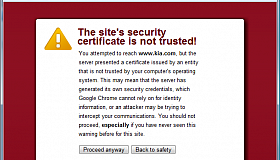What Is SSL (Secure Sockets Layer) and What Are SSL Certificates?
SSL is an acronym for Secure Sockets Layer, an encryption technology that was created by Netscape in the 1990s. SSL creates an encrypted connection between your web server and your visitors’ web browser allowing for private information to be transmitted without the problems of eavesdropping, data tampering, or message forgery.
SSL allows sensitive information such as credit card numbers, social security numbers, and login credentials to be transmitted securely. Normally, data sent between browsers and web servers is sent in plain text—leaving you vulnerable to eavesdropping. If an attacker is able to intercept all data being sent between a browser and a web server they can see and use that information.
To enable SSL on a website, you will need to get an SSL Certificate that identifies you and install it on the server. The use of an SSL certificate on a website is usually indicated by a padlock icon in web browsers but it can also be indicated by a green address bar. Once you have done the SSL install, you can access a site securely by changing the URL from http:// to https://. When an SSL certificate is installed on a website, you can be sure that the information you enter (contact or credit card information), is secured and only seen by the organization that owns the website.
Millions of online businesses use SSL certificates to secure their websites and allow their customers to place trust in them. In order to use the SSL protocol, a web server requires the use of an SSL certificate. SSL certificates are provided by Certificate Authorities (Cas).

Google boosts SSL-encrypted sites in search results
Google launched a new ranking signal to give HTTPS sites a ranking boost, a small ranking boost, to encourage webmasters to migrate their sites from HTTP to HTTPS.
Security firms welcomed Google’s stance as an effective push towards that widely agreed web security goal of HTTPS everywhere and by default.
Unlike Penguin or Panda algorithms, this is a ranking signal that is run in real time. As soon as Google indexes your new HTTPS URL, that URL will immediately see a tiny ranking boost because of the HTTPS URL. That doesn’t mean you will see your rankings jump from result number 5 to 4, but it will, behind the scenes, have a small, tiny, boost in the overall ranking algorithm.
If you have some parts of your site migrated to HTTPS and some parts not, Google will give the boost to the ones on the HTTPS URLs and not to the others. The signal is on a per-URL basis, and not on a site wide basis. Of course, Google wants you to migrate your whole site to HTTPS but if you want to do it in stages or test it out, technically you can do it on a URL by URL basis.
In practice, how is SSL used in today’s modern e-commerce enabled / online workflow and service society?
In what cases SSL certificate makes sense:
Here is a succinct list of use cases where getting a SSL encryption is a smart move:
- To secure online credit card transactions.
- To secure system logins and any sensitive information exchanged online.
- To secure the transfer of files over https and FTP services such as website owners updating new pages to their websites or transferring large files.
- To secure hosting control panel logins and activity like Parallels, cPanel, and others.
- To secure intranet based traffic such as internal networks, file sharing, extranets, and database connections.
- If data being transmitted over the Internet or network needs confidentiality. In other words, people do not want their credit card number, account login, passwords or personal information to be exposed over the Internet.
- If data needs to remain integral, which means that once credit card details and the amount to be charged to the credit card have been sent, a hacker sitting in the middle cannot change the amount to be charged and where the funds should go.
- If your organization needs identity assurance to authenticate itself to users and ensure them they are dealing with the right organization.
- If your organization needs to comply with regional, national or international regulations on data privacy, security and integrity.
Get SSL Certificate for small businesses, blogs and personal websites
Google has encouraged all sites to secure visitor information with SSL Certificates. That means that whether the Website collects personal information or not, Google will reward sites with SSL Certificates with a boost in search ranking. The issue of HTTPS migration is understandably complex for many, and there’s clearly a lot of information to take on board following Google’s announcement.
Moving over to HTTPS isn’t without risk, and care should be taken when redirecting traffic from the non-HTTPs to the HTTPs version of your website. A poorly implemented SSL certificate can often lead to errors displaying for users, whilst improper redirection can also cause issues relating to duplicate content.

if you’re planning on making the switch to HTTPS I would strongly suggest to get in touch so we could discuss your requirements. Please bear in mind that although SSL certificate could help boosting your SEO performance – quality, original website content, produced by a trusted author that is widely shared by your target audience will almost certainly provide better results at this moment in time
